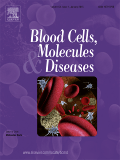Blood Cells, Molecules and Diseases
Blood Cells, Molecules and Diseases[edit | edit source]
Blood Cells, Molecules and Diseases is a peer-reviewed scientific journal that focuses on the study of hematology, the branch of medicine concerned with the study of blood, the blood-forming organs, and blood diseases. The journal publishes original research articles, reviews, and case reports that contribute to the understanding of the biology and pathology of blood cells and the molecular mechanisms underlying blood diseases.
Scope and Focus[edit | edit source]
The journal covers a wide range of topics within the field of hematology, including but not limited to:
- The biology and function of red blood cells, white blood cells, and platelets.
- The molecular and cellular mechanisms of hematopoiesis, the process by which blood cells are formed.
- The pathophysiology of blood disorders such as anemia, leukemia, lymphoma, and thrombocytopenia.
- The role of cytokines, growth factors, and other signaling molecules in blood cell development and disease.
- Advances in the diagnosis and treatment of blood diseases, including gene therapy and stem cell transplantation.
Editorial Policies[edit | edit source]
The journal maintains rigorous editorial standards to ensure the publication of high-quality research. Manuscripts are subjected to a thorough peer-review process by experts in the field. The editorial board consists of leading scientists and clinicians who are actively engaged in hematology research.
History[edit | edit source]
Blood Cells, Molecules and Diseases was established to provide a dedicated platform for the dissemination of research findings in the field of hematology. Over the years, it has become a respected source of information for researchers, clinicians, and students interested in the study of blood and its disorders.
Impact and Contributions[edit | edit source]
The journal has contributed significantly to the advancement of knowledge in hematology. It has published landmark studies that have enhanced the understanding of blood cell biology and the molecular basis of blood diseases. The research published in the journal has implications for the development of new diagnostic tools and therapeutic strategies.
Related Pages[edit | edit source]
Transform your life with W8MD's budget GLP1 injections from $125 and up biweekly
W8MD offers a medical weight loss program NYC and a clinic to lose weight in Philadelphia. Our W8MD's physician supervised medical weight loss centers in NYC provides expert medical guidance, and offers telemedicine options for convenience.
Why choose W8MD?
- Comprehensive care with FDA-approved weight loss medications including:
- loss injections in NYC both generic and brand names:
- weight loss medications including Phentermine, Qsymia, Contrave, Diethylpropion etc.
- Accept most insurances for visits or discounted self pay cost.
- Generic weight loss injections starting from just $125.00 for the starting dose
- In person weight loss NYC and telemedicine medical weight loss options in New York city available
Book Your Appointment
Start your NYC weight loss journey today at our NYC medical weight loss, and Philadelphia and visit Philadelphia medical weight loss Call (718)946-5500 for NY and 215 676 2334 for PA
Search WikiMD
Ad.Tired of being Overweight? Try W8MD's NYC physician weight loss.
Semaglutide (Ozempic / Wegovy and Tirzepatide (Mounjaro / Zepbound) available. Call 718 946 5500.
Advertise on WikiMD
|
WikiMD's Wellness Encyclopedia |
| Let Food Be Thy Medicine Medicine Thy Food - Hippocrates |
Translate this page: - East Asian
中文,
日本,
한국어,
South Asian
हिन्दी,
தமிழ்,
తెలుగు,
Urdu,
ಕನ್ನಡ,
Southeast Asian
Indonesian,
Vietnamese,
Thai,
မြန်မာဘာသာ,
বাংলা
European
español,
Deutsch,
français,
Greek,
português do Brasil,
polski,
română,
русский,
Nederlands,
norsk,
svenska,
suomi,
Italian
Middle Eastern & African
عربى,
Turkish,
Persian,
Hebrew,
Afrikaans,
isiZulu,
Kiswahili,
Other
Bulgarian,
Hungarian,
Czech,
Swedish,
മലയാളം,
मराठी,
ਪੰਜਾਬੀ,
ગુજરાતી,
Portuguese,
Ukrainian
Medical Disclaimer: WikiMD is not a substitute for professional medical advice. The information on WikiMD is provided as an information resource only, may be incorrect, outdated or misleading, and is not to be used or relied on for any diagnostic or treatment purposes. Please consult your health care provider before making any healthcare decisions or for guidance about a specific medical condition. WikiMD expressly disclaims responsibility, and shall have no liability, for any damages, loss, injury, or liability whatsoever suffered as a result of your reliance on the information contained in this site. By visiting this site you agree to the foregoing terms and conditions, which may from time to time be changed or supplemented by WikiMD. If you do not agree to the foregoing terms and conditions, you should not enter or use this site. See full disclaimer.
Credits:Most images are courtesy of Wikimedia commons, and templates, categories Wikipedia, licensed under CC BY SA or similar.
Contributors: Prab R. Tumpati, MD



